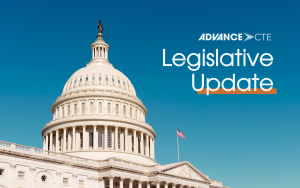 This week, the Senate introduced a legislative proposal that would make significant updates to legislation that authorizes federal research and data functions, while lawmakers in the House introduced new bipartisan proposals that would reform the Pell Grant program to make shorter-term Career Technical Education (CTE) programs eligible for funding as well as a comprehensive reauthorization proposal for the Workforce Innovation and Opportunity Act (WIOA).
This week, the Senate introduced a legislative proposal that would make significant updates to legislation that authorizes federal research and data functions, while lawmakers in the House introduced new bipartisan proposals that would reform the Pell Grant program to make shorter-term Career Technical Education (CTE) programs eligible for funding as well as a comprehensive reauthorization proposal for the Workforce Innovation and Opportunity Act (WIOA).
HELP Committee Unveils Bipartisan Education Sciences Reform Act Reauthorization
Earlier this week the Senate Health, Education, Labor and Pensions (HELP) Committee unveiled the Advancing Research in Education Act (AREA) — bipartisan legislation that would reauthorize and update the Education Sciences Reform Act (ESRA). ESRA authorizes many critical federal education data and research functions and this proposal would make significant updates to many aspects of this legislation. Specifically, AREA would make education research more responsive to the needs of learners, teachers and other education stakeholders while increasing the use of rigorous evidence to better support teaching and learning. Of note for the CTE community, this legislation would broaden the scope of these activities to include a stronger focus on learners’ labor market and workforce outcomes.
Advance CTE has been engaged throughout this wider reauthorization process, including by supporting the introduction of the Data for American Jobs Act (DAJA) earlier this year. Encouragingly many aspects of this proposal have been incorporated in the current committee draft proposal. A mark-up of AREA is scheduled for next week on Tuesday, December 12 at 10 a.m. ET. Read the HELP committee summary on the proposed changes contained in AREA.
House Leaders Release New Workforce Pell Proposal
On Tuesday, December 5, Reps. Stefanik (R-NY) and DeSaulnier (D-CA), along with House Education and Workforce Committee Chair and Ranking Member Foxx (R-NC) and Scott (D-VA), introduced H.R. 6586, the Bipartisan Workforce Pell Act (BWPA). This legislation is a compromise proposal that combines aspects of previously introduced short-term Pell Grant legislative proposals sponsored by Chair Foxx and Ranking Member Scott respectively. The BWPA would establish a number of eligibility criteria that would be overseen and implemented by state workforce development boards, higher education accreditors and the U.S. Department of Education intended to ensure program quality and rigor. Advance CTE is encouraged to see additional bipartisan movement on this critical issue and is continuing to analyze the bill for implications for the CTE community. More information can be accessed in this fact sheet and related summary.
House Committee Introduces Comprehensive WIOA Reauthorization Proposal
Yesterday, December 7, the House Education and Workforce (E&W) Committee introduced H.R. 6655, A Stronger Workforce for America Act (ASWA). The legislation would comprehensively reauthorize WIOA and make significant changes to core aspects of this legislation including related to eligible training provider lists and the provision of training services provided by the system. Encouragingly, the proposal would make significant improvements to workforce data infrastructure and linkages, codify grant programs for community college training initiatives and would strengthen alignment between career pathways and CTE programs of study among other aspects of the legislation. Advance CTE and partners are continuing to review this proposal and anticipate further consideration of the legislation sometime early next week.
FY24 Funding Negotiations Make Little Progress
As shared previously, Congress recently passed another short-term extension of federal fiscal year 2023 (FY23) funding just before Thanksgiving. This continuing resolution (CR) created a “laddered” approach to funding federal operations with Labor, Health and Human Services, Education, and Related agencies (Labor-HHS-ED) appropriations extending funding through February 2, 2024 (along with seven other funding bills), while four other bills expire January 19, 2024.
Since that time, however, lawmakers have struggled to make meaningful progress toward negotiating full-year FY24 appropriations legislation. This includes a lack of agreement on “topline” levels for the federal budget needed to develop individual sub-allocations for each of the 12 individual spending bills that compose federal operations, including the Labor-HHS-ED measure which provides funding for the Carl D. Perkins Career and Technical Education Act (Perkins V) and other programs of interest to the CTE community.
As a reminder, conservative lawmakers in the House have spent most of the calendar year seeking to advance legislation that would significantly and dramatically cut funding for the entire federal budget, including for many workforce development and education programs. Most recently, this faction of House Republicans now appears to be softening demands for steep cuts to federal spending, including these investments. Despite this modest progress, agreement between lawmakers on this critical topline issue still appears to be out of reach this week. House Speaker Mike Johnson (R-LA) recently floated the idea of a year-long CR if agreement could not be reached soon. However, leaders in the Senate have vocally opposed this idea.
As these efforts continue to take shape, Advance CTE will continue to advocate for robust and strengthened funding for Perkins V’s state grant program and other funding priorities of the CTE community.

